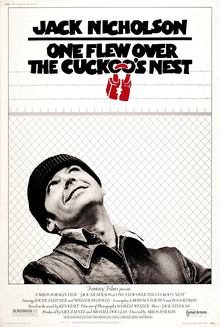One Flew Over the Cuckoo's Nest is beginning to show its age, as any 41-year-old movie must. It no longer exhibits the freshness that won it acclaim as a masterpiece and raked in the five "major" Academy Awards: picture, director, actor, actress, and screenplay -- only the second picture in history to do that: The first was
It Happened One Night (Frank Capra, 1934), and only one other picture,
The Silence of the Lambs (Jonathan Demme, 1991), has subsequently accomplished that feat. Today, however,
One Flew has the look of a skillfully directed but somewhat predictable melodrama; its tragic edge has been blunted by familiarity. In treating the material, director Forman goes for straightforward storytelling, without showing us something new or personal as an auteur. And as time has passed, some of the elements of the source, Ken Kesey's novel, that screenwriters Laurence Hauben and Bo Goldman took pains to mitigate -- namely the countercultural glibness and antifeminism -- have begun to show through. It's harder today to wholeheartedly cheer on the raw, anarchic antiauthoritarianism of McMurphy (Jack Nicholson) or to accept as a given the unmitigated villainy of Nurse Ratched (Louise Fletcher). We want our protagonists and antagonists to be a little more complicated than the film allows them to be. There are still many who think it a great film, but if it is, I think it's largely because it's the perfect showcase for a great talent -- Nicholson's -- supported by an extraordinary ensemble that includes a shockingly young-looking Danny DeVito, Scatman Crothers, Sidney Lassick, Christopher Lloyd, Will Sampson, and a touchingly vulnerable Brad Dourif.

